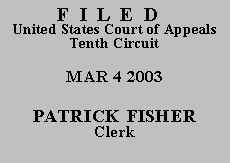

(D. Kansas)
ROWANA K. RIGGS,
Before EBEL
After examining the briefs and appellate record, this panel has determined
unanimously that oral argument would not materially assist the determination of
this appeal. See Fed. R. App. P. 34(a)(2); 10th Cir. R. 34.1(G). The case is
therefore ordered submitted without oral argument.
Rowana K. Riggs, acting pro se,(1) appeals the district court's dismissal of her civil rights complaint for failure to state a claim upon which relief can be granted.(2) Exercising jurisdiction under 28 U.S.C. § 1291 (2003), we affirm.
On September 27, 2000, Ms. Riggs filed a pro se complaint against American Heritage Life Insurance Company ("American") claiming she became totally disabled due to bilateral carpal tunnel syndrome and seeking damages for alleged violations of her civil rights stemming from American's refusal to pay total disability under two credit disability insurance policies. The district court liberally construed her complaint to state claims for denial of disability benefits in violation of Title VII of the Civil Rights Act of 1964, 42 U.S.C. § 2000e, et seq., and Titles I, II and III of the Americans with Disabilities Act ("ADA"), 42 U.S.C. § 12111, et seq.(3)
We review de novo the dismissal of a complaint for failure to state a claim upon which relief can be granted under Fed. R. Civ. P. 12(b)(6). Sutton v. Utah State Sch. for the Deaf & Blind, 173 F.3d 1226, 1236 (10th Cir. 1999). "[A]ll well-pleaded factual allegations in the . . . complaint are accepted as true and viewed in the light most favorable to the nonmoving party. A 12(b)(6) motion should not be granted unless it appears beyond doubt that the plaintiff can prove no set of facts in support of his claim which would entitle him to relief." Id. (internal quotations and citations omitted). Although we liberally construe a pro se complaint, "we will not supply additional factual allegations to round out a plaintiff's complaint or construct a legal theory on a plaintiff's behalf." Whitney v. New Mexico, 113 F.3d 1170, 1175 (10th Cir. 1997).
We turn now to Ms. Riggs's complaint.(4) Title VII of the Civil Rights Act protects against employment discrimination. Ms. Riggs does not claim an employment relationship with American. Therefore, her Title VII claim fails. Title I of the ADA prohibits employment discrimination by a "covered entity." 42 U.S.C. § 12112(a). Since Ms. Riggs did not and apparently could not demonstrate American is a "covered entity,"(5) this claim fails. Further, her claim under Title II of the ADA fails because Title II protects disabled persons from discrimination by a "public entity." 42 U.S.C. § 12132. Ms. Riggs cannot demonstrate American is a "public entity."(6) Finally, Ms. Riggs's claim under Title III of the ADA fails because she seeks only damages, and Title III limits the remedy of a private claim to injunctive relief. 42 U.S.C. § 12188(a)(1).
We conclude Ms. Riggs was unable to establish any facts in support of her claim which would entitle her to relief. Therefore, the district court was correct to dismiss her complaint for failure to state a claim and its judgment is AFFIRMED.
Entered by the Court:
TERRENCE L. O'BRIEN
United States Circuit Judge
*. This order and judgment is not binding precedent except under the doctrines of law of the case, res judicata and collateral estoppel. The court generally disfavors the citation of orders and judgments; nevertheless, an order and judgment may be cited under the terms and conditions of 10th Cir. R. 36.3.
1.We liberally construe a pro se appellate brief. Cummings v. Evans, 161 F.3d 610, 613 (10th Cir. 1998), cert. denied, 426 U.S. 1052 (1999).
2.American moved for summary judgment or, in the alternative, for dismissal for failure to state a claim. The district court considered both alternatives sound. We will confine our review to dismissal for failure to state a claim upon which relief can be granted, pursuant to Fed. R. Civ. P. 12(b)(6).
3.Ms. Riggs filed a like claim in the United States District Court for the District of Kansas on September 27, 2000, against the CUNA Mutual Insurance Society, a case at one time consolidated with this case for pre-trial proceedings. Her claims against CUNA, like those in this case, were eventually dismissed by the district court for failure to state a claim upon which relief can be granted, pursuant to Fed. R. Civ. P. 12(b)(6). Ms. Riggs appealed and we affirmed. Riggs v. CUNA Mutual Ins. Soc'y, 42 Fed. Appx. 334 (10th Cir. 2002), 2002 WL 1462892 (unpublished opinion).
4.In her appellate brief, Ms. Riggs claims for the first time a violation of 42 U.S.C. § 1981. We need not reach the merit of this claim because we will not consider an argument unless it is first presented to the district court. Walker v. Mather (In re Walker), 959 F.2d 894, 896 (10th Cir. 1992).
5."Covered entity" is defined as "an employer, employment agency, labor organization, or joint labor-management committee." 42 U.S.C. § 12111(2).
6."The term 'public entity' means (A) any State or local government; (B) any department, agency, special purpose district, or other instrumentality of a State or States or local government; and (C) the National Railroad Passenger Corporation, and any commuter authority (as defined in section 502(8) of Title 45)." 42 U.S.C. § 12131(1).